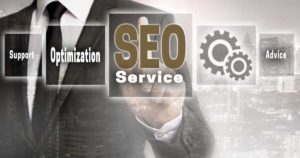The digital realm is expanding at lightning speed. Every day, around 547,200 new websites launch worldwide. That’s a staggering number.
In this vast ocean of websites, how do large-scale businesses ensure they don’t just float, but sail smoothly, reaching their target audiences effectively?
Most SEO strategies that work wonders for small to medium-sized websites crumble when scaled up.
Larger corporations, with their vast array of products, services, and global audiences, demand an approach that’s not just scaled up, but specifically tailored.
Enter ‘Enterprise SEO’. Unlike its standard counterpart, Enterprise SEO isn’t just about more keywords or more backlinks.
It’s a strategic approach, specifically designed to navigate the complexities of large-scale businesses.
By the end of this guide, you’ll understand its nuances, significance, and how it’s changing the game in the digital universe.
Defining Enterprise SEO

Let’s cut through the noise. Enterprise SEO is SEO supercharged.
It’s the process of optimizing large-scale websites to enhance search visibility.
But here’s the kicker: It’s not just about size.
We’re talking about sites with thousands, often millions, of pages. Think Amazon, eBay, or Walmart.
Their SEO needs? As complex as their inventory.
The difference is in the details:
- Scale: The sheer number of pages demands automation and advanced tools.
- Complexity: These sites often cater to diverse audiences, products, and regions.
- Stakeholders: Decision-making involves multiple departments, from IT to marketing.
Comparison between Standard SEO and Enterprise-level SEO:

Imagine a local bookstore’s website. Standard SEO for them might involve optimizing for keywords like “bookstore in [city]” or “buy mystery novels in [city].” They focus on local traffic, specific niches, and direct competition.
Now, picture Amazon’s book section. They aren’t just targeting one city, one genre, or one audience. The strategies that our local bookstore uses? They won’t scratch the surface for Amazon.
Here’s the breakdown:
- Scope: While standard SEO might tackle dozens of keywords, enterprise SEO juggles thousands, even millions.
- Tools: Enterprise SEO demands robust platforms like BrightEdge or Botify, whereas standard SEO might get by with simpler tools.
- Strategy: Standard SEO is often about quick wins. Enterprise SEO? It’s a long game, requiring constant tweaking and forecasting.
- Integration: Enterprise SEO must weave into the broader digital marketing tapestry, from PPC campaigns to email marketing.
In essence, while both aim for search visibility, Enterprise SEO operates in a league of its own, demanding a unique skill set and strategic approach.
Characteristics of Enterprise SEO
Here are the important characteristics of Enterprise SEO:
1. Scale and Complexity of Websites
Dive into the web, and you’ll soon realize: not all websites are created equal. Enterprise websites are behemoths, both in scale and complexity.
They’re not just “big” — they’re vast, dynamic, and multifaceted. Multiple products or services, various global locations, and diverse user needs make these sites intricate puzzles.
2. Large Amounts of Web Pages

If the average website were a novel, enterprise websites would be encyclopedias. We’re not talking hundreds of pages — think thousands, or even millions.
This volume isn’t just for show. Each page caters to specific segments of their broad audience, from product listings to regional portals.
It’s not about quantity alone; it’s about targeted, quality content at scale.
3. Need for a More Strategic and Structured Approach
With size comes responsibility. You can’t wing it with Enterprise SEO. Success requires a strategic blueprint, crystal-clear objectives, and a systematic approach.
Every move, from keyword selection to content creation, needs precision, foresight, and consistent monitoring. It’s chess, not checkers.
4. Integration with Other Business Systems and Processes
In the enterprise world, SEO isn’t an island. It’s deeply intertwined with a company’s ecosystem. Think CRM systems, content management platforms, or even inventory databases.
The SEO strategy often feeds into, and is influenced by, other digital marketing channels like PPC, email campaigns, and social media marketing.
Seamless integration is the name of the game, ensuring the user experience is cohesive and business objectives are aligned.
In a nutshell, Enterprise SEO isn’t just “bigger” SEO. It’s a distinct discipline, demanding a blend of technical acumen, strategic prowess, and the ability to zoom out and see the bigger picture.
Challenges in Enterprise SEO

Here are some of the major challenges for Enterprise SEO:
1. Handling Multiple Stakeholders and Departments
Enterprise SEO isn’t a one-person show. It’s a symphony with multiple players — from marketing teams to IT, from content creators to data analysts.
Everyone has an opinion. Everyone has priorities. Ensuring collaboration while managing varied interests?
That’s a juggling act. But it’s crucial. Why? Because disjointed efforts can dilute SEO effectiveness.
2. Aligning SEO Strategies with Broader Business Goals
Here’s the thing: SEO isn’t just about rankings or traffic in the enterprise arena.
It’s about driving business growth.
But aligning intricate SEO strategies with ever-evolving business objectives?
That’s no walk in the park.
It demands a deep understanding of the company’s mission, vision, and goals, and then weaving SEO tactics that bolster them.
3. Keeping up with Multiple Markets, Languages, and Regions:
Picture this: An enterprise operates in 40 countries, each with its cultural nuances, languages, and market dynamics.
Tailoring SEO for each? It’s like shooting a moving target.
From geo-specific content to handling hreflang tags for multilingual sites, the complexity scales exponentially with each added region.
4. Ensuring Consistent Branding and Messaging Across Vast Content:
Brands are built on consistency.
But when you’re dealing with massive content volumes, spread across diverse markets and platforms, maintaining a unified brand voice and messaging becomes a Herculean task. One slip?
It can lead to brand dilution or even miscommunication.
In essence, while the potential of Enterprise SEO is vast, the challenges are real and varied.
But as any SEO aficionado will tell you: challenges aren’t roadblocks, they’re opportunities in disguise. It’s all about perspective and strategy.
Key Components of Enterprise SEO

Here are some of the key components of enterprise SEO:
Advanced Technical SEO (Site Structure, Site Speed, Schema)
At the heart of Enterprise SEO lies a strong technical foundation. It’s not just about meta tags and headers. We’re talking site architecture that’s intuitive and scalable.
Page load speeds need to be lightning-fast — every second lost can mean thousands in revenue gone.
And schema? Essential. It’s like giving search engines a roadmap of your content, ensuring they understand and display it effectively.
Comprehensive Keyword Research Across Various Product Lines and Services
Generic keywords won’t cut it here. Enterprise-level keyword research dives deep.
It’s about finding that sweet spot between search volume and relevancy across myriad products and services.
It’s granular, segmented, and often, it’s the difference between being seen and being overlooked in the search results.
Content Strategy and Optimization at Scale
Content is king. But in the enterprise realm, it’s an empire.
This isn’t about churning out articles; it’s about crafting content that resonates, informs, and engages — all while being SEO-optimized.
From blog posts to product descriptions, each piece needs to work in harmony, driving the brand narrative and satisfying search intent.
In-depth Analytics, Reporting, and ROI Measurement
Numbers don’t lie. But in Enterprise SEO, numbers tell stories.
With vast amounts of data pouring in, in-depth analytics and reporting become vital. It’s not just about tracking rankings or organic traffic.
It’s about measuring ROI, understanding user behavior, and gleaning insights to refine strategies continually.
Integration with Other Digital Marketing Channels
In the digital landscape, SEO is just one piece of the puzzle. But it’s a pivotal piece.
Enterprise SEO thrives when integrated seamlessly with PPC campaigns, email marketing, social media outreach, and more.
It’s a cohesive dance, where each channel amplifies the other, ensuring the brand remains front and center.
All these components, when executed effectively, form the backbone of a successful Enterprise SEO campaign. It’s intricate, expansive, and undeniably rewarding for those who master its nuances.
Benefits of Effective Enterprise SEO
Why should any company invest in Enterprise SEO? Here is the detailed answer:
· Enhanced Online Visibility for a Wide Range of Products/Services
In the vast digital ocean, visibility is everything. Effective Enterprise SEO isn’t just about showing up — it’s about standing out.
When done right, businesses witness a surge in organic visibility for a spectrum of their offerings, ensuring they capture diverse audience segments.
Think about it: why limit your reach when you can be the go-to brand for multiple needs?
· Improved User Experience Across Large Websites

User experience (UX) isn’t just a buzzword; it’s the essence of a successful site. With optimized site structure, faster load times, and intuitive navigation — all facets of Enterprise SEO — users glide smoothly through the site.
The outcome? Happy visitors, lower bounce rates, and a higher likelihood of conversions.
· Scalability and Adaptability in Rapidly Changing Markets
Enterprises operate on a grand scale, and their SEO strategies need to keep pace.
Effective Enterprise SEO provides a framework that scales seamlessly, whether it’s launching new product lines or entering novel markets.
Moreover, it’s agile, ready to pivot when market dynamics shift, ensuring the brand remains relevant and ahead of the curve.
· Competitive Edge in Crowded Market Spaces
The digital marketplace is bustling, often with multiple brands vying for the same audience slice. How do you rise above the noise?
Through robust Enterprise SEO strategies that not only boost organic rankings but also position the brand as an authoritative voice.
When you consistently show up and provide value, you aren’t just another brand; you’re THE brand.
Effective Enterprise SEO isn’t a mere add-on; it’s a game-changer. In an era where digital dominates, it paves the path to not just survive, but to thrive and lead.
Tools and Technologies for Enterprise SEO
Here are some recommended tools and technologies for Enterprise SEO:
SEO Platforms Tailored for Large Websites (e.g., BrightEdge, Botify)

When you’re dealing with massive websites, your regular SEO tools might not cut it. Enter platforms like BrightEdge and Botify.
Tailored for the heavy lifting, they dive deep into the intricacies of large-scale sites, providing insights that are both granular and actionable.
These tools offer a comprehensive view, from site crawl diagnostics to content performance, ensuring every SEO action is data-backed.
Advanced Analytics and Data Visualization Tools
Data is the lifeblood of Enterprise SEO. But with tons of data flowing in, comprehension can be a challenge.
That’s where advanced analytics and visualization tools step in.
Think of platforms like Tableau or Google Data Studio — they transform raw data into visual narratives, making patterns evident and insights pop.
It’s like having a magnifying glass for your data, revealing every nuance.
Integration Tools for CRM, CMS, and Other Enterprise Systems
Enterprise SEO doesn’t operate in isolation. It’s a cog in the vast machinery of enterprise operations.
Tools that facilitate integration with CRM systems like Salesforce, CMS platforms like Adobe Experience Manager, and other vital systems are pivotal.
This integration ensures that the SEO strategy aligns with sales, marketing, content, and more, creating a synchronized, holistic approach.
The beauty of these tools and technologies? They don’t just simplify Enterprise SEO; they amplify its impact.
With the right tools in hand, SEO professionals can cut through the complexity, drive efficiency, and harness the full potential of Enterprise SEO.
In a digital-first world, that’s not just an advantage; it’s a necessity.
Best Practices for Implementing Enterprise SEO
Implementing Enterprise SEO can be hassle free with these tips:
Establishing a Dedicated Enterprise SEO Team or Collaborating with Specialized Agencies:
Enterprise-level challenges require enterprise-level solutions.
Whether it’s forming an in-house powerhouse of SEO experts or partnering with a specialized agency, the focus should be on expertise.
This ensures that your strategies are not just robust but also tailored to your enterprise’s unique needs. Remember, generic strategies yield generic results.
Setting Clear KPIs and Measurement Metrics

What gets measured gets managed. In the vast world of Enterprise SEO, direction comes from data-driven goals.
By setting clear Key Performance Indicators (KPIs), you’re not shooting in the dark; you’re aiming with precision.
Whether it’s organic traffic growth, conversion rates, or SERP visibility, having tangible metrics ensures you can track, tweak, and triumph.
Continuous Training and Keeping Abreast with the Latest SEO Trends
SEO isn’t static; it’s ever-evolving. Algorithms change, trends shift, and what worked yesterday might not work tomorrow.
Continuous training becomes non-negotiable
It’s about staying ahead of the curve, ensuring your strategies are not just current but also future-ready. Dive into webinars, workshops, and industry reports. Equip yourself to be the trailblazer, not the follower.
Ensuring Cross-Departmental Communication and Collaboration
SEO, in an enterprise context, isn’t a solitary endeavor. It intertwines with content, meshes with marketing, and dovetails with design.
Seamless communication across departments is paramount.
This collaboration fosters a holistic approach, where every element, from content creation to UX design, works in harmony with SEO goals.
In essence, implementing Enterprise SEO is like orchestrating a symphony. Each section, be it strings or brass, plays its part.
But the magic? It happens when they all come together, creating a melody that’s harmonious, powerful, and resonates with the audience.
That’s the goal. That’s the pinnacle of Enterprise SEO.
Real-world Examples of Enterprise SEO Success

Here are some of the real world examples of Enterprise SEO success:
Case Study 1: Adobe’s Product-Centric SEO Approach
Situation: Adobe, known for its extensive range of digital products, faced a challenge: each product had its own unique audience and keywords, making a unified SEO strategy tricky.
Action: Adobe decided to approach SEO on a product-by-product basis. They conducted deep keyword research for each product, optimized individual product pages, and ensured that each product’s content was tailored for its specific audience.
Result: Adobe saw a significant increase in organic traffic to individual product pages. The laser-focused content resonated with specific user bases, leading to higher engagement and conversion rates.
Case Study 2: Airbnb’s Localization Strategy
Situation: With a presence in over 190 countries, Airbnb needed to ensure its platform was accessible and optimized for users across different regions and languages.
Action: Airbnb invested in a localization strategy, tailoring content for different regions, translating listings, and optimizing for local search terms. They also ensured that the user experience was culturally relevant.
Result: Airbnb experienced a surge in organic traffic from multiple regions, establishing itself as a global leader in the accommodation space. The localized content enhanced user trust, resulting in more bookings and repeat users.
Case Study 3: IBM’s Thought Leadership through Content
Situation: IBM, a giant in the tech industry, wanted to assert its position not just as a product leader, but as a thought leader.
Action: IBM ramped up its content marketing strategy. They began publishing in-depth articles, research papers, and data reports on emerging tech trends. Each piece was SEO-optimized, targeting high-value keywords related to industry innovations.
Result: IBM’s content began ranking for competitive keywords, driving organic traffic to their domain. The high-quality content bolstered IBM’s reputation as an industry thought leader, leading to enhanced brand trust and credibility.
Lessons Learned and Impact on Overall Business Growth:

- Tailored Strategies Work: Whether it’s Adobe’s product-centric approach or Airbnb’s localization, tailored strategies that consider unique business facets yield better results.
- Content is King: IBM’s success underscores the importance of quality content. It’s not just about driving traffic; it’s about establishing authority.
- Enterprise SEO is Holistic: It’s not just about rankings and traffic. From enhancing user trust (Airbnb) to boosting brand credibility (IBM), SEO impacts multiple facets of business growth.
In a nutshell, these real-world examples underscore the transformative potential of Enterprise SEO. When strategized and executed effectively, SEO isn’t just a marketing tool; it’s a catalyst for holistic business growth.
Conclusion
In today’s digital age, where businesses battle for online visibility, Enterprise SEO isn’t just a nice-to-have—it’s an imperative.
Remember, for large corporations, every incremental improvement in search rankings can equate to substantial traffic and potential revenue.
It’s not about being online; it’s about being found, being relevant, and being a step ahead in a bustling digital marketplace.









